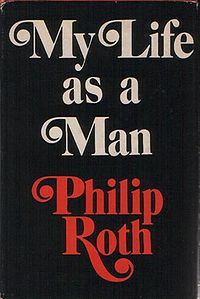
My Life As a Man
Encyclopedia

Philip Roth
Philip Milton Roth is an American novelist. He gained fame with the 1959 novella Goodbye, Columbus, an irreverent and humorous portrait of Jewish-American life that earned him a National Book Award...
's seventh novel.
Summary
The work is split into two sections: the first section, "Useful Fictions," consisting of two short stories about a character named Nathan ZuckermanNathan Zuckerman
Nathan Zuckerman is a fictional character who appears as the narrator or protagonist of many of Philip Roth's works of fiction.-Character:...
(although this character frequently featured in Roth's later novels, scholarship has revealed this not to be the same character), and the second section, "My True Story," which takes the form of a first-person memoir by Peter Tarnopol, a Jewish writer who authored the two stories in the first section.
Themes
My Life As a Man is the first of Roth's work that tackles the issue of the writer's relationship to his work, a theme he would develop in subsequent novels, particularly Operation ShylockOperation Shylock
Operation Shylock: A Confession is novelist Philip Roth's 19th book and was published in 1993.-Summary:The novel follows narrator "Philip Roth" on a journey to Israel, where he attends the trial of accused war criminal John Demjanjuk and becomes involved in an intelligence mission—the "Operation...
. In his autobiography, Roth reveals that much of Tarnopol's life is based on his own experiences; for example, Roth's destructive marriage to Margaret Martinson
The Facts: A Novelist's Autobiography
The Facts: A Novelist's Autobiography is a book by Philip Roth that traces his life from his childhood in Newark, New Jersey to becoming a successful, widely respected novelist...
, which is portrayed through Tarnopol's relationship with the character of Maureen.
Reception
In The New York Times Book ReviewThe New York Times Book Review
The New York Times Book Review is a weekly paper-magazine supplement to The New York Times in which current non-fiction and fiction books are reviewed. It is one of the most influential and widely read book review publications in the industry. The offices are located near Times Square in New York...
, critic Morris Dickstein compared the novel to its predecessor Portnoy's Complaint
Portnoy's Complaint
Portnoy's Complaint is the American novel that turned its author Philip Roth into a major celebrity, sparking a storm of controversy over its explicit and candid treatment of sexuality, including detailed depictions of masturbation using various props including a piece of liver...
:
No writer, not even MailerNorman MailerNorman Kingsley Mailer was an American novelist, journalist, essayist, poet, playwright, screenwriter, and film director.Along with Truman Capote, Joan Didion, Hunter S...
or LowellRobert LowellRobert Traill Spence Lowell IV was an American poet, considered the founder of the confessional poetry movement. He was appointed the sixth Poet Laureate Consultant in Poetry to the Library of Congress where he served from 1947 until 1948...
, has contributed more to the confessional climate than Philip Roth. Thanks to "Portnoy's Complaint" a good slice of contemporary fiction seems to come verbatim from the writer's own hours on the couch. This would be a dubious distinction had Roth's book not also boldly altered the tone of our confessional writing, most of which had been lugubrious and realistic, smothered in angst and high-seriousness. Reaching back instead to the raunchy, delirious autobiographical manner of Henry Miller and CÈline--indeed, perpetuating an unseemly imitation of the latter's great "Death on the Installment Plan"--Roth pitched his anguish in such a low comic strain that the effect was irresistible. If there has been a funnier novel in the last 10 years, or one that exploits sex, psychoanalysis, and the "family romance" more brilliantly, I don't know what it could be.
...Like Rousseau's "Confessions" and its modern progeny, "My Life as a Man" is reckless in inviting us to review the man rather than the writer: that's part of its appeal. To get the story out Roth is willing to look not only ignoble and self-centered, but also foolish, helpless, even a little ugly (as in Peter's final satisfaction at his wife's death). But if the personal-confessional mode highlights Roth's limitations it also returns him to the day-to-day carnival of human folly that he can describe so ringingly, so comically, even as it goes on tormenting him.

